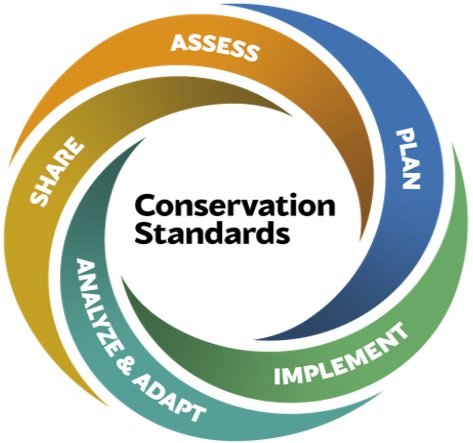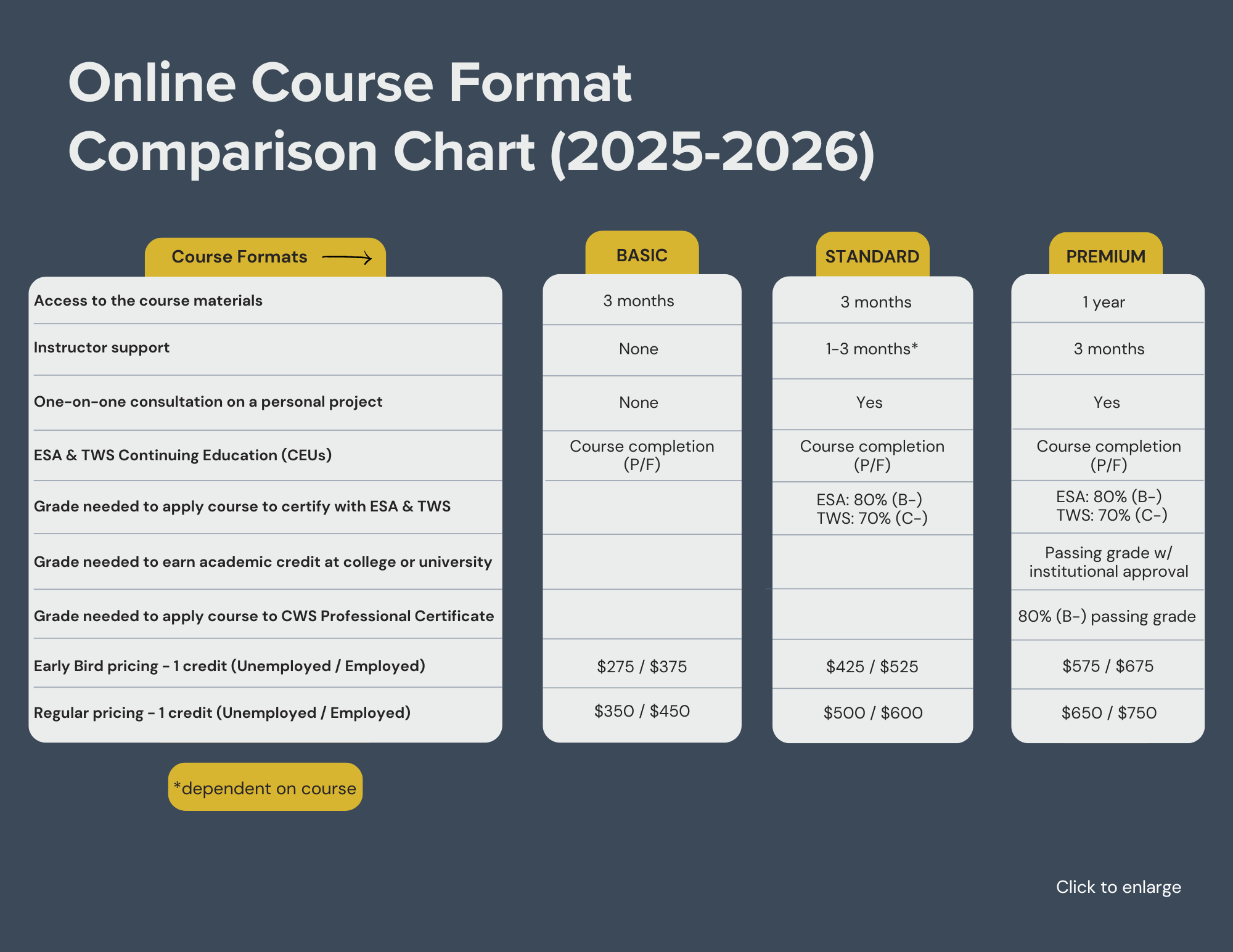***Watch our free webinar discussion of conservation planning careers here on YouTube***
-
STANDARD and PREMIUM formats:
This course combines instruction and hands-on application to teach you how to work with partners to create and implement a conservation plan that leverages resources effectively and focuses efforts to achieve real impact. The principles, tools, and best practices are based on a framework known as the Conservation Standards. Through 11 training videos, which you can view at your convenience (approximately 20 minutes each), the instructor teaches the fundamentals of how to bring a team together, develop a shared vision, identify critical threats, prioritize actions, and create a monitoring plan to enable the team or partnership to maximize its impact at reducing critical threats and restoring ecological values. You will also learn how to account for risks associated with climate change and how to incorporate human well-being values. During seven weekly class periods, you will work with your coach-led team to create the elements of a strategic plan for a case study. Class periods are designed to simulate a real project team wrestling with real world challenges.
BASIC format
You will watch the same 11 training videos, but instead of working with a coach on a project team, you will practice applying the teachings to a case study from Africa through a series of self-paced exercises. “Answer sheets” are provided so after working through an exercise, you can self-assess by seeing how the real team in Africa built their plan.
***Want to learn more about conservation planning careers? Watch the free webinar from instructor Dr. Quinn Shurtliff (certified conservation coach and founder of NaturePlan) and John Morrison (Director of Conservation Planning and Measures at the World Wildlife Fund). The recording is available on YouTube here.***
-
Winter: BASIC format only, December 1, 2025 – February 22, 2026 (Early bird* ends November 2nd)
Fall: September 2 - December 11, 2025.
BASIC format is learn at your own pace and includes access to course materials for the duration of the term.
STANDARD and PREMIUM formats (Fall term) also include:
Live (recorded) lectures Tuesdays & Thursdays, 12:00–3:00 p.m. (EST), November 18–December 11, 2025
*Early bird pricing saves $75
-
Basic understanding of ecological and conservation practices is helpful, but no prior experience with the Conservation Standards is necessary.
-
-
Module 1: Introduction to the Conservation Standards; team, scope, and vision
Relate why the Conservation Standards framework is useful in planning.
Determine who should be part of the team.
Identify the type of scope and define the project’s scope.
Reach consensus on the team’s vision.
Module 2: Focal values; viability assessment for conservation values
Narrow the pool of potential conservation and human well-being values down to a small number.
Perform a viability assessment and identify appropriate key attributes and indicators of conservation values.
Module 3: Human wellbeing value viability assessment and threat brainstorming
Conduct a viability assessment of human wellbeing values and identify appropriate key attributes and indicators.
Evaluate model outputs and performance via goodness-of-fit tests, information-theoretic model selection, and specific parameter estimates.
Module 4: Threat prioritization and situation analysis
Prioritize threats based on a set of rating criteria.
Articulate and organize factors contributing to threat persistence in a situation diagram.
Module 5: Selection of conservation actions and theory of change
Create a situation diagram.
Brainstorm potential actions and prioritize them.
Create a results chain.
Module 6: Goals and objectives; climate change
Set SMART objectives and goals for each prioritized strategy.
Assess the potential impacts to a project due to climate change and adjust the conservation plan accordingly.
Module 7: From planning to doing
Create a high-level and 12-month work plan.
Create a monitoring plan that tracks plan implementation, outcomes, and impact.
Establish quarterly and annual team meetings to review data and progress, solve problems, and adjust the plan.
COURSE OPTIONS & INFORMATION (Review chart above, then click below)
-
FORMAT:
Self-paced. No live sessions with an instructor. May email instructor with questions.
Four modules containing a total of 10 sessions. A bonus module is also available that teaches how to incorporate climate change issues into a Conservation Standards-based plan.
Students will watch one or two training videos (15–25 minutes each) in each session and then complete an exercise to apply the new principle or tool to a case study based on a real project in Cameroon.
Brief comprehension quizzes after each session will help a student to self-evaluate learning.
3 months of access to course materials.
Course materials become available when the course opens.
CONTINUING EDUCATION:
16 CEUs with The Wildlife Society
4 CEUs in Category I(a): Scientific Education and Training with the Ecological Society of America (go to our Continuing Education Page for more details)
-
FORMAT
Seven live classes (3 hours each) led by the instructor. Classes will be recorded in case the student misses a day (but, time in break-out groups may not be recorded).
Homework consists of watching one or two training videos (15–25 minutes each) before each class and taking short learning comprehension quizzes. On rare occasions, a few extra minutes may be required for additional homework. Prior to the first class, expect 60-90 minutes of homework to prepare.
During each class, the instructor will summarize highlights from the training videos, answer questions, use examples to demonstrate how to apply new principles and tools, and lead the class or breakout group as if they were a project team developing a strategic plan.
Access to online course materials, including presentations, homework assignments, and case study materials are available for three months.
BONUS: After the course is over, the student has an opportunity (optional) to schedule a 1:1 meeting with the instructor to discuss how to apply the Conservation Standards to their own project or next steps in their learning.
CONTINUING EDUCATION:
16 CEUs with The Wildlife Society
4 CEUs in Category I(a): Scientific Education and Training with the Ecological Society of America (go to our Continuing Education Page for more details)
CERTIFICATIONS:
Earn 1 credit toward certification as an Ecologist (at any level) with Ecological Society of America
Earn 1 credit toward certification as an Associate/Certified Wildlife Biologist® (at any level) with The Wildlife Society
-
FORMAT:
PREMIUM format is identical to STANDARD format.
12 months of access to course materials
CONTINUING EDUCATION:
16 CEUs with The Wildlife Society
4 CEUs in Category I(a): Scientific Education and Training with the Ecological Society of America
Go to our Continuing Education Page for more details
CERTIFICATIONS:
Earn 1 elective credit toward a professional certificate in Conservation Planning with CWS
Earn 1 credit (at any level) with Ecological Society of America
Earn 1 credit toward certification as an Associate/Certified Wildlife Biologist® (at any level) with The Wildlife Society
ACADEMIC CREDIT:
Earn 1 academic credit (go to our Academic Credit Page for details)
Earn an additional 1-2 academic credits with an Applied Project
INSTRUCTOR
Dr. Quinn Shurtliff and associates






